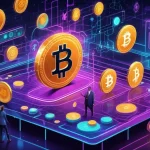SEC’s October 10 Deadline: Will Altcoin ETFs for Solana and XRP Ignite a Market Boom?

SEC’s October 10 Deadline Looms: Will Altcoin ETFs Spark a Financial Revolution?
The U.S. Securities and Exchange Commission (SEC) faces a critical juncture with an October 10 deadline to approve or deny a wave of altcoin exchange-traded funds (ETFs), spotlighting Solana (SOL) while XRP, Dogecoin, and Litecoin wait in the wings. Whispers of a fast-tracked decision—potentially as early as August or September—have ignited hope and skepticism alike in the crypto community, as these products could funnel billions from Wall Street into decentralized assets.
- SEC Timeline: October 10 deadline for altcoin ETF decisions, with speculation of earlier approvals.
- Solana Spotlight: S-1 filings due by July’s end; first staking fund already trading with strong inflows.
- Broader Altcoin Push: XRP, Dogecoin, and Litecoin ETFs pending, amidst legal and market uncertainties.
Altcoin ETFs: A Bridge to Mainstream Finance
For the uninitiated, ETFs are publicly traded funds that track the price of an underlying asset—like Solana or XRP—allowing investors to gain exposure without directly owning cryptocurrency. Think of them as a slice of crypto you can buy through your regular brokerage account, no digital wallet or blockchain know-how required. They’re a gateway for traditional investors, potentially driving massive capital into the market. After Bitcoin and Ethereum ETFs broke through in 2024, altcoin ETFs represent the next frontier, promising to legitimize these assets in the eyes of institutional players. But with high stakes come high risks—volatility, regulatory roadblocks, and the ever-present threat of scams lurk behind the hype.
Solana’s ETF Edge and Legal Limbo
Solana, a high-speed blockchain powering booming decentralized finance (DeFi) and memecoin activity, is the frontrunner in this ETF race. Issuers like Canary Marinade, 21Shares, and Bitwise are scrambling to amend their S-1 applications for spot Solana ETFs by the end of July, a clear signal of the SEC’s structured—if hurried—review process. Last week, Rex Shares scored a win with SSK, the first Solana staking fund to trade, racking up $33 million in trades and $12 million in inflows, with $8 million in volume in just the first 20 minutes. Bloomberg ETF analyst James Seyffart didn’t mince words, calling it a:
“Healthy start to trading.”
Those numbers scream market appetite, but the SEC isn’t one for handing out solo victories. Historically, they’ve synchronized approvals for Bitcoin and Ethereum ETFs to avoid first-mover advantages, and now other Solana applicants are demanding the same fair shake after Rex Shares’ early triumph. If spot Solana ETFs get the green light in August or September, analysts from Northstake and JPMorgan project $4-8 billion in inflows within the first year. That’s the kind of cash that could trigger a second wave of crypto FOMO (fear of missing out) in traditional markets, spiking prices and visibility much like Bitcoin’s ETF-driven 20% market cap surge in 2024.
Yet, Solana’s not out of the woods. The SEC claims SOL is a security—an investment contract under heavy regulatory oversight, akin to stocks or bonds. If slapped with this label, Solana faces compliance burdens that could stall ETF approvals. Ongoing lawsuits against major exchanges listing SOL aren’t helping, though securities lawyer Yuriy Brisov argues Solana’s operational focus on speed and utility could dodge the securities tag. It’s a coin toss, and the outcome could set a precedent for how altcoins are regulated moving forward. Community discussions around Solana ETF approval possibilities reflect this uncertainty and anticipation.
XRP’s Courtroom Drama: A Make-or-Break Moment
While Solana battles on the tech front, XRP’s ETF prospects hinge on a war of attrition in the courts. At least seven XRP ETF applications, from heavyweights like Bitwise, Canary Capital, Franklin Templeton, and Grayscale, sit on the SEC’s desk. A 2023 ruling by Judge Analisa Torres gave XRP a partial win, stating it’s not inherently a security except in institutional sales—a clearer legal footing than Solana. But centralization concerns tied to Ripple’s outsized influence remain a thorn in its side, as Bitget COO Vugar Usi Zade has pointed out. Ripple recently dropped its cross-appeal in the SEC lawsuit, with hopes the SEC will follow suit, potentially clearing the path for ETF nods. ETF Store President Nate Geraci suggests a resolution could even lure BlackRock, with expert insights on BlackRock’s potential involvement adding weight to this speculation. Yet, a recent court rejection of a joint filing to slash Ripple’s $125 million fine to $50 million proves the saga isn’t over. Yahoo Finance pegs first-week inflows for XRP ETFs at $400-800 million if approved—an eye-watering sum, but only if the legal dust finally settles.
Dark Horses: Dogecoin and Litecoin in the Race
Beyond Solana and XRP, other altcoins are jockeying for ETF status. Dogecoin, the meme coin born as a joke, might soon sit at finance’s grown-ups’ table—irony at its peak. Meanwhile, Litecoin, launched in 2011, could be the sleeper hit. Bloomberg’s Seyffart flags it as a dark horse due to its long history and relatively clean regulatory slate, potentially making it more palatable to cautious SEC officials. While Solana and XRP dominate headlines with flash and drama, Litecoin’s quiet stability might just sneak it past the finish line. Approval odds are murky for these underdogs, but their inclusion shows the breadth of altcoin interest—and the SEC’s challenge in wrestling with such a diverse field.
Political Winds: Trump Era and SEC Shifts
Zooming out, the broader regulatory landscape is shifting. Gary Gensler’s exit as SEC chair, after years of “regulation by enforcement” targeting crypto via actions against Coinbase and Binance, marks a turning point. The Trump administration, sworn in on January 20, 2025, has signaled a pro-crypto stance, with speculation of a more lenient SEC head like Paul Atkins taking the reins. This could tip the scales for altcoin ETFs, though Bloomberg’s Seyffart warns an early decision before October 10 would be “out of the norm.” Approval probabilities reflect cautious optimism: Bloomberg analysts peg altcoin ETF chances at 85%, while Polymarket odds for XRP by 2025 have dipped to 80% from a high of 98.2%, and Solana sits at 85%. Nearer-term bets for July 31, 2025, are grimmer—36% for Solana and 40% for XRP—hinting at skepticism about a swift resolution. The race for Solana ETF approval is under intense scrutiny as deadlines approach.
Risks and Rewards: What Investors Must Know
Let’s cut through the hype. Altcoin ETFs could be a game-changer, onboarding millions to crypto and disrupting traditional finance’s chokehold. But they’re not a golden ticket. Volatility is a given—approvals might spike prices, only for regulatory hiccups or market dumps to burn latecomers. Institutional inflows could also skew markets, opening doors to manipulation or over-leveraging, while retail investors might misread ETFs as “safe” bets. And don’t forget the scams—fake funds and pump-and-dump schemes thrive in bull cycles. We’ve got no patience for that garbage, so do your homework before tossing money at any shiny new product. For those curious about risks tied to XRP investments, thorough research is essential.
Then there’s the irony for decentralization purists. ETFs, while boosting adoption, risk centralizing access through Wall Street gatekeepers—a bitter pill for a movement hell-bent on cutting out middlemen. For Bitcoin maximalists like myself, altcoin ETFs can feel like a distraction from the true king of decentralized value. Bitcoin’s design as a store of value doesn’t need to play every role—Solana’s low-cost transactions fuel DeFi, XRP targets cross-border payments, and Dogecoin, well, memes the hell out of culture. There’s space for these niches in the financial uprising, but let’s not pretend altcoins are Bitcoin’s equal in disrupting the status quo.
Global Ripple Effects and Historical Echoes
Looking back, Bitcoin’s ETF approval in January 2024 took a decade of rejections and legal fights, while Ethereum’s spot ETFs followed in May after years of futures trading. Altcoins face a shorter but equally thorny path. A curious hint at future infrastructure surfaced with a brief listing of XRP and Solana futures on CME Group’s website—later removed as an error—but it nods to the kind of regulatory scaffolding that paved Bitcoin’s way. Globally, U.S. approvals could spur reactions in the EU or Asia, where crypto regulations vary wildly. If Solana or XRP ETFs launch, expect a domino effect, with capital flows and copycat products reshaping markets worldwide. But if the SEC stalls, it could cede ground to more progressive jurisdictions, leaving American investors on the sidelines. Analysts have already started weighing in on the market impact of Solana and XRP ETFs with bold predictions.
Key Takeaways and Questions on Altcoin ETFs
- What’s the SEC’s timeline for altcoin ETF decisions?
The SEC must decide by October 10, though rumors of an accelerated push to August or September persist, despite analyst doubts about early action. - Why is Solana leading the altcoin ETF charge?
Solana’s high-speed blockchain and DeFi dominance, plus the successful launch of Rex Shares’ staking fund, make it a top contender, though securities lawsuits remain a hurdle. - How does the SEC ensure fairness among ETF filers?
The SEC often synchronizes approvals to prevent first-mover advantages, a tactic used for Bitcoin and Ethereum ETFs, and now demanded by Solana applicants after Rex Shares’ head start. - What market impact could altcoin ETFs have?
Approvals might drive $4-8 billion in inflows for Solana and XRP ETFs in the first year, sparking FOMO in traditional markets, but volatility and scams pose significant risks. - How does the Ripple-SEC lawsuit affect XRP ETFs?
A potential resolution could unlock approvals and attract giants like BlackRock, though a recent court setback over fines shows lingering uncertainty. - Could Litecoin outpace Solana or XRP for ETF approval?
Bloomberg analysts note Litecoin’s long history and cleaner regulatory status position it as a dark horse, potentially appealing to cautious regulators over flashier altcoins. - How might altcoin ETFs impact Bitcoin’s dominance?
While boosting overall crypto adoption, they could divert focus from Bitcoin’s core mission as a decentralized store of value, though altcoins fill niches Bitcoin doesn’t target.
The road to altcoin ETFs is paved with promise and peril. Solana’s tech edge and XRP’s legal progress fuel optimism, with 85% approval odds per Bloomberg offering a strong bet. Yet regulatory shadows, market risks, and centralization debates could derail the hype train. Litecoin’s underdog status and political shifts in Washington add wildcards to the mix. Whether the SEC moves in August, October, or beyond, their call will shape crypto’s march into the mainstream. We’re rooting for disruption and decentralization, but not at the cost of reckless shilling or scam-fueled disasters. Stay sharp, dig into the details, and let’s see if altcoin ETFs truly ignite the next phase of this financial revolution—or just fizzle under bureaucratic weight.



